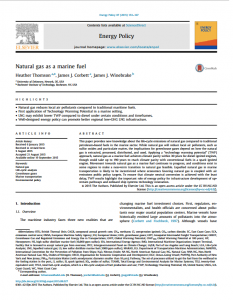Full Title: Natural Gas as a Marine Fuel
Author(s): Heather Thomson, James J. Corbett, and James J. Winebrake
Publisher(s): Elsevier
Publication Date: September 1, 2015
Full Text: Download Resource
Description (excerpt):
This paper provides new knowledge about the life-cycle emissions of natural gas compared to traditional petroleum-based fuels in the marine sector. While natural gas will reduce local air pollutants, such as sulfur oxides and particulate matter, the implications for greenhouse gases depend on how the natural gas is extracted, processed, distributed, and used. Applying a “technology warming potential” (TWP) approach, natural gas as a marine fuel achieves climate parity within 30 years for diesel ignited engines, though could take up to 190 years to reach climate parity with conventional fuels in a spark ignited engine. Movement towards natural gas as a marine fuel continues to progress, and conditions exist in some regions to make a near-term transition to natural gas feasible. Liquefied natural gas in marine transportation is likely to be incentivized where economics favoring natural gas is coupled with air emissions public policy targets. To ensure that climate neutral conversion is achieved with the least delay, TWP results highlight the important role of energy policy for infrastructure development of upstream pathways and onboard ship systems technology innovation.
